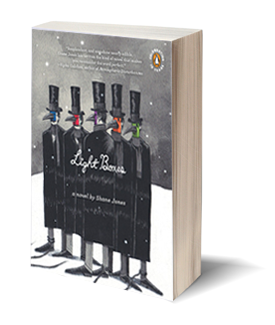Light BoxesBy Shane Jones |
 |
|---|
Reviewed by J.A. Tyler
Though summer is now our expectation, Shane Jones' Light Boxes is all about February, the constant grays and whites, the struggle to overcome and, in Thaddeus’ case, the failure of it all. Light Boxes is very much about the testing of one man, how much he can take or withstand before he breaks. But unlike the biblical narrative of Job, Shane Jones’ protagonist Thaddeus must break before he can see the answers:
After Thaddeus called off all wars against February, the town’s sadness reached a new depth. Two members of the War Effort flung themselves from the blacksmith’s ship. Another cut his wrists open in the middle of the street, and dead vines poured from his body, grew through the street and covered a cottage. Shopkeepers wept through the night. The beekeepers had their bees sting their necks in order to stop their crying. Snow mixed with ice and a sheet of lightning fell from the sky. And Thaddeus Lowe could be seen walking through town wearing nothing but cutoff burlap pants, commenting to his neighbors about the beautiful weather.
Job, as the story goes, is tested. His faith is in question and thus, via plagues and pestilence and death, Job is tempted to lose or give up faith in a god he loves. Thaddeus Lowe, Jones’ character centerpiece, is tested by a personified February who stays well-past spring and into years, drawing out the cold and the ice and the snow and the misery. And like the devil to Job, this February does more to Thaddeus than merely snow the town under and project cold fists. February restricts flight, erases aeronautical history, overwhelms the people in vast swimming depressions, and steals the town’s children, including Thaddeus’ own daughter Bianca. But rather than highlight the goodly faith of the tested, the stubborn will to never give in, to never give up, Light Boxes shows us failure. Jones spends most of this tremendous book illustrating the great variety and range of Thaddeus’ failures as he attempts healing method after healing method, searching for a restored flight, a regained history, and a recovery of both the children and the townsfolk. And Thaddeus, through insanity and loss, must fail before he can convalesce.
What is at stake in this kind of book—in this kind of reading of Light Boxes—is the notion that it is not our ability to stay standing that defines us, but rather in our ability to find feet again, once we have been down.
Thaddeus fails because February is a vicious constant, a loping giant with clouds-hands whose Lenny-esque mentality is as stubborn as it is endearing. And Thaddeus fails too because our world is not always about winning, about victory—it is often about failing, about falling, about being nearly crushed under the weight of loss. Thaddeus fails because he must. Without failure there is no redemption. Without falling there is no need to rise. Without wreckage there is no semblance of perfection:
Thaddeus wore the light box on his head when he ascended in the balloon toward the holes in the sky. Beneath him the town was flames and dark smoke. It filled the sky around him. From a great distance, where the rest of the town was climbing up from the tunnels and into their new homes, they could see the balloon glowing with each pulse of flame and a box of light flickering in the darkness.
And so we get Thaddeus, stripped of his family and finally believing in the reality of this harsh February, rising above his burning town, rising up to challenge his god, the birth-father of his cold oppression.
I reviewed the Publishing Genius Press edition of Light Boxes when it was released in February of 2009, and I spent the review marveling at Jones’ adept and flawless pursuit of imagery and descriptive fervor, the way he takes phrases and makes them into dreams and then folds those dreams in our pockets for safekeeping. Having read the new Penguin version of Light Boxes, I am no less amazed by Jones’ transformative and liquid language, but I also now better see how Light Boxes finds its legs in failure, how Thaddeus’ departure into insanity and return to heroics is a phenomenal new version of Job’s age-old narrative, set by Jones in a brilliantly modern context where failure overrides victory and where we are only able to see the glory of a blue sky because of the depth of our February, the layers of our snow, the massive grays and whites that so often hold us at bay, until we are ready.
Light Boxes is a winter catching fire. Go get some heat.
